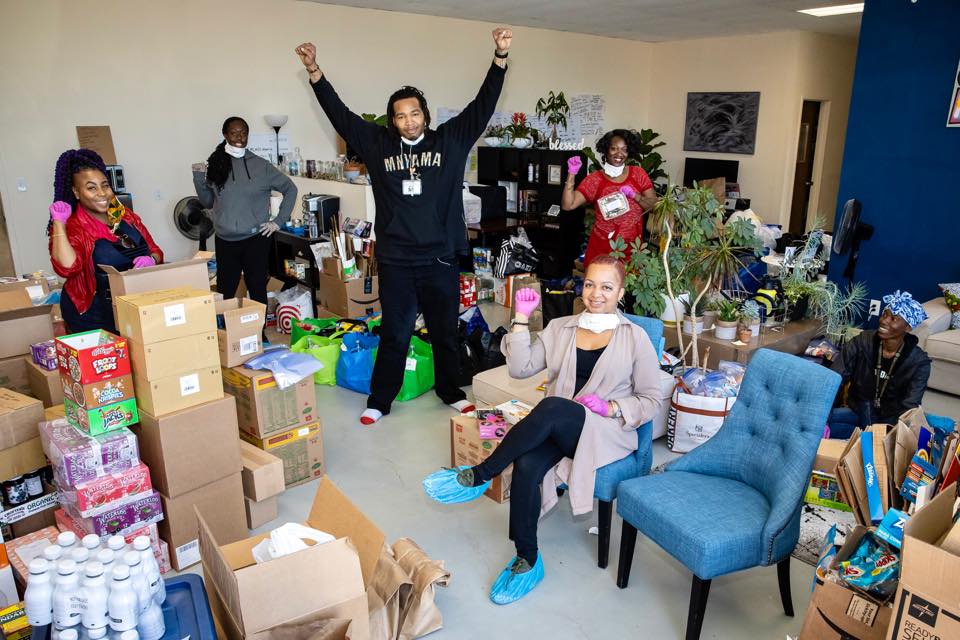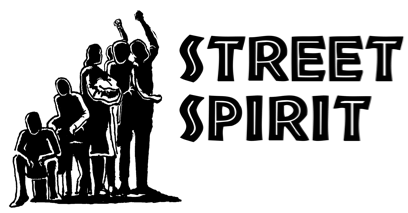How Has Covid-19 Impacted Homeless Advocates and Service Providers?

EOC staff, members, and our volunteers have had to re-imagine their direct service programs and response efforts since the onset of the COVID-19. (Courtesy of the East Oakland Collective)
May 12, 2020
Many of the public services and spaces unhoused people rely on have temporarily stopped or closed. Those that remain open are overburdened and under-resourced.
The over 5,000 unhoused residents of Berkeley and Oakland struggle to find the most basic necessities as libraries and restaurants are closed, and food banks and meal providers face overwhelming need. Homeless people who could previously patch together a comfortable routine are now missing crucial sources of income and comfort: Panic-shoppers have cleared the shelves of essential items, such as bottled water, and panhandling is no longer on the table as a last-ditch effort to stave off hunger—which According to the National Law Center on Homelessness and Poverty, can bring in as much as $300 a month. With fewer people out in public, artists and other street vendors—including those that sell this very paper—cannot bring in much-needed income.
For advocates and those in the nonprofit sector racing to meet these needs, the pandemic highlights the extent to which unhoused people rely on an informal safety net of nonprofits, advocates, and volunteers to survive.
For the groups that serve unhoused people, the pandemic has increased need and added additional expenses. At the same time, it has decreased the funding and volunteer base that is typically available to support those experiencing homelessness in the East Bay. In response to this, advocates who support the unhoused community are working exponentially harder with fewer resources and greater personal risk.
At Berkeley’s Dorothy Day House, about a third of volunteers aren’t able to come in because they’re in vulnerable groups, Volunteer Coordinator Bob Whalen said in a recent interview. He says the Dorothy Day House needs more volunteers and more donations. The center is serving boxed meals as a precaution, which has sent food and packaging costs through the roof, Whalen said. He says the program usually feeds about fifty meals, twice a day. “Right now we are serving probably twice as many,” Whalen said.
The Berkeley Community Resource Center, which works in tandem with Dorothy Day House, is starting to see the impact of the unprecedented spike in unemployment brought about by the shelter in place order, said Program Manager Robbie Montoya.
“Like every other agency, our numbers have increased,” Robbie said. But due to the coronavirus, the increased need is met with fewer resources for the unhoused. Whereas the BCRC provided about 40 showers in three hours before the pandemic, these days they can only let two people in the building at a time. “So time-wise and social distancing-wise, 10 seems to be the number that we can honestly do.” Similarly, while the facility can usually run ten loads of laundry a day, now they can only get through four.
Orton likens outreach to breathing: “You can’t just take a deep breath and stop breathing,” he said. “You have to breathe again and again.”
For some providers who continue to offer meals to the unhoused, the increased need has not led to more folks lining up. JC Orton, of Berkeley’s Night on the Streets Catholic Worker, which has provided buffet-style meals on Sunday mornings in Berkeley for over two decades, said a recent breakfast had just over half the number of attendants as the week before. Similarly, Orton said in early March, his volunteer base shrunk significantly. However, Orton has started providing additional meals throughout the week to fill in where a handful of other meal providers have had to close their doors since the start of shelter in place. “For a lot of these folks, they eat with us or they don’t eat,” he said. (Disclaimer: Orton is the Vendor Coordinator for Street Spirit.)
In Oakland, the East Oakland Collective’s work has expanded dramatically. The group is now providing food and hygiene kits to the immunocompromised, the low-income, those with disabilities and the elderly as well as Oakland’s unhoused residents, Executive Director Candice Elder said in a recent interview. They’ve done this despite the fact that their regular caterer has closed. They now serve over a thousand meals a week—that’s more than double the 400 weekly meals they were serving before the pandemic.
For many grassroots advocacy groups, efforts to support the unhoused have been stymied by poor coordination with the city, county and state, said Needa Bee, a lead advocate with Oakland-based advocacy group, The Village. Grassroots organizations like hers struggle to get supplies because they don’t have contracts with the city. “We’re in the encampment way more than the nonprofits who are getting paid to do this,” Bee said. “We’re there on the weekends, we’re there at night, we’re there before office hours.”
Many who work with the unhoused community have seen increased interest in volunteering, but social distancing requirements complicate harnessing that workforce. The East Oakland Collective is relying on only its core group of volunteers and asking others who want to help to donate money, or something off their Amazon Wishlist if they can.
Needa Bee presses on in her advocacy and community support despite having lost both of her usual streams of income due to the outbreak. She’s working with The Village much more than usual, she said. The Village has tripled their food distribution efforts, added masks, gloves and hand sanitizer to the sanitation kits they distribute and redoubled their efforts to build tiny houses to shelter the unhoused.
But the coronavirus is not just complicating the regular work these homeless advocates perform. It has also created a myriad of new challenges for them to meet.
Advocacy groups are working to meet the increased technological needs of the unhoused population. While many used to rely on libraries and restaurants to charge their devices, now they’re doing so at the BCRC, or on solar chargers the East Oakland Collective is working to place in encampments.
The East Oakland Collective distributes kits with items like soap and bath tissue, but hygiene is still a major concern, according to Elder. She says the 40-odd sanitation stations the city has provided to encampments still leave over 60 encampments without somewhere for residents to wash their hands. To make matters worse, the coronavirus has even complicated access to bottled water.
The rationing of bottled water has had a big impact on Oakland’s unhoused community, Elder said. She says many homeless folks regularly buy bottles or gallons of water to drink and to bathe, but stores are restricting the amount of bottled water a person can buy at a time. “If you can only go to the store to buy two cases or two gallons of water with each trip, that is very limiting,” Elder said. “I know of many different unhoused folks who have complained about that. They couldn’t get what they need because people were panic-buying.”
Talya Husbands-Hankin, of Love and Justice in the Streets, is also concerned about lack of access to hygiene. While the city of Oakland has made an effort to place more portable restroom and sanitation stations in local encampments, the stations are not being regularly serviced, she said. The stations run out of soap and water, so people cannot practice good hygiene. “Wash stations are sitting empty,” she said. “And that’s unacceptable.”
Husbands-Hankin has shifted much of her advocacy work to focus on pushing the City of Oakland to open more hotel rooms for the unhoused. “The scale to which they’ve opened hotel rooms is absolutely insufficient for the scale that we need,” she said. Advocacy efforts include encouraging East Bay residents to call their city and county-level representatives, as well as socially distant in-person demonstrations, and fundraising.
Love and Justice in the Streets has partnered with the East Oakland Collective and the Village to place more people in hotel rooms by using donations from the “Fill Hotels Not Graves” GoFundMe page. Through this effort, they have moved 29 people into hotel rooms thus far. These organizations are also part of a statewide effort called “No Vacancy California” to encourage the state to open more rooms to the unhoused. The rented hotels include volunteer coordinators and medical volunteers provided by the East Oakland Collective, the Village and Love and Justice in the Streets.
One thing being stressed by those who work with the unhoused is that while Coronavirus has changed the way we interact, it hasn’t changed the level of commitment and compassion needed to really connect with people.
Both Orton and Montoya stress the importance of consistency and trust. The strength of the existing relationships these organizations have convey that their advice on hand-washing and social distancing come from a place of compassion.
Orton likens outreach to breathing: “You can’t just take a deep breath and stop breathing,” he said. “You have to breathe again and again.”
For Montoya, building trust within the unhoused community is something that happened in real time. “The BCRC has been up and running since August of last year,” she said. At first, “people were very leery of us,” she said. But after a few months, “there was a shift.” She says that trust is vital now. “I’ve heard some really vicious rumors,” She said. “The best that we can do is just reassure them that they’re not going to be rounded up. They’re not going to be treated in that manner.”
Through all of this, advocates say they are holding up as well as can be expected. Montoya works hard to ensure she and her staff at the BCRC are taking time for themselves. Elder is working every day, just like before the crisis. With her work, she says it’s simply the nature of the beast. And JC Orton still goes out at sunrise six mornings a week to offer support, fresh sleeping bags, and what he sees as the most important element of all: hope.
“There are people out there that care,” he said. “And if we can go and attack the world with hope, that would be a great change for the world being affected by this horrible virus.”
Daniel Lempres is a freelance reporter based in Oakland. He focuses on local government, policing and housing policy. He’s contributed to the East Bay Express, Berkeleyside and the Humboldt Times-Standard. Daniel is a Master’s Candidate at UC Berkeley’s Graduate School of Journalism.


